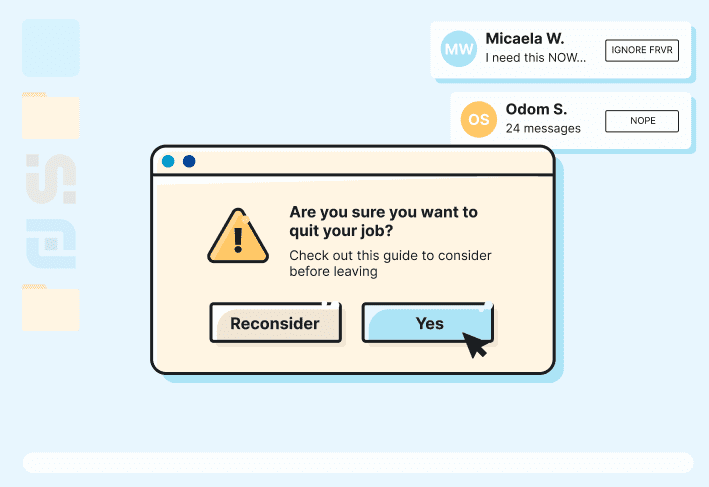If you’ve ever fantasized about leaving your job in IT to become a goat farmer, you’re not alone.
Around 42% of IT professionals have a high risk of burnout, which is frightening when you think about it. What would companies look like without IT professionals? Kiss technical support, security testing, device management, infrastructure support, and so many other tasks that make organizations run goodbye.
And it doesn’t help that many IT professionals already feel like they have a thankless job. Because so much of the work is done behind the scenes, end users — and oftentimes, business leaders — may not see the value IT professionals bring until something breaks. Then, it’s on IT to fix the problem as soon as possible. It’s easy to see how that cycle can lead to burnout among IT professionals.
We leaned on our internal sysadmins at PDQ and browsed Reddit for some of the signs it’s time to leave your job in IT — and what to consider before moving on to a new opportunity.
1. There’s no work-life balance
A good work-life balance is important for any role, but it’s even more important for roles prone to burnout and stress.
If your current job is constantly seeping into your personal life, it may be a sign it's time to leave your job in IT. Granted, IT jobs may require you to occasionally work overtime, but when this occasional request becomes a new job requirement just to keep the ship afloat, you’re going to burn out faster than you would if you had a better work-life balance.
One sysadmin, who prefers to remain anonymous, notes how a lack of work-life balance led to burnout — and, ultimately, a career change.
“My job started to impact my home life. I was so burned out. My stress levels were always through the roof. No matter how much I asked or pleaded, management failed to help me offload or shift tasks to give me a break. There wasn’t an end in sight, which made me feel hopeless in terms of my career.”
2. There’s no upward mobility or career growth
When your responsibilities increase but your title and salary stay the same, it’s a red flag that can quickly lead to decreased job satisfaction at your current company.
Even if your boss and upper management are great to give you accolades and sing your praises, as the saying goes, “Praise doesn’t pay the bills.”
And unfortunately, this can oftentimes spark a vicious cycle. You go above and beyond your assigned duties with the hopes of being promoted. But since you’re already doing the work you’d be doing with a promotion, you aren’t promoted.
“If compensation and promotions don't keep up with your skillset, that’s a huge problem. If you can't get promoted or get good comp bumps...they're not gonna promote you next time. You're already doing the work for them.” — Taylor, software engineer
You should regularly do your research to make sure you’re being fairly compensated for the work you do. Even if your organization doesn’t have salary transparency, there are tools you can use to find salary ranges for your job title and the duties you’re performing. A few great resources are O*NET, the U.S. Bureau of Labor Statistics, Glassdoor, and PayScale.
And if you’re looking for salary information specific to sysadmins, check out our State of Sysadmin report.
3. You can feel yourself changing — in a bad way
Think about how you feel in your current position. Do you struggle to muster up the willpower to go to work every day? Do you feel more irritable than usual? Can you feel yourself sinking to a dark place mentally? Do you feel your stress levels are unusually high? These could be signs that your work environment is having a negative impact on you.
Several Reddit users note these and other symptoms that told them it’s time to leave their jobs in IT.
“Not wanting to get out of bed to go to work, buildup of irritation while driving in and constantly at work, getting frustrated at the smallest things on a daily basis are a few that I’ve experienced. It feels like depression and anger bundled together and not knowing how to get out.” — DryB0neValley
“I dreaded waking up in the morning, found it hard to do things like pack lunches...and work-related organization things like writing lists. I couldn't think as well as I normally could at work.” — CloudySysAdmin
“Short tempered, lack of motivation, etc...” — networkslave
4. Your org sets unrealistic budgets
If you find that the budget isn’t realistic or conducive to properly staffing your team, it may be time to leave.
Implementing new tools and strategies is great, but only if you’ve got a proper budget to do so. Salary and headcount are factors to consider as well. For example, if you’re being tasked with an assignment that will take up most of your days, it may be time to consider hiring an additional team member to offload other duties to. If that option isn’t on the table, you’re effectively being asked to do more with less — a problem Taylor, a software engineer, reflects on. “Slashing costs/outsourcing/layoffs are all red flags. You don’t do more with less. You do less with less.”
5. You have unrealistic goals to meet
There’s nothing worse than being given a list of goals only to realize that you lack the time, tools, and headcount to reach them.
Or the asks themselves are...complex.
“At a different job as a sysadmin, I was tasked with learning how to do asbestos abatement to drill and mount things in classrooms. Ordinarily, our facilities department was against the idea of IT drilling holes in anything, even a desk we wanted to run cables through. But both techs in the facilities had failed their asbestos certifications, and their manager refused to even attempt the test himself.” — Sid, solutions manager
Just like no job is worth your mental health, no job is worth your physical health. If you feel you’re being asked to put your health at risk to do your duties, it may be time to leave your job.
6. You’d rather be a goat farmer than go to work
Reddit user hestolethatguyspiza started a conversation on the site with an intriguing title: “I wanna be a goat farmer.”
Their post details the sad realities of their job.
“Caseload has gone up, quality is going down. More work is thrown at me, and expectations are high. Customers emailing me constantly for updates, but I don't have time to research since I am trying to meet these ******* SLAs, which my response quality has lowered significantly. So new clients are not getting my best, current clients want their stuff to be fixed NOW, and each day I am stressing knowing I am bound to get more new work. I'm tired. I asked for a few days off in July a couple weeks ago, all of it denied.”
The real heartbreaker? hestolethatguyspiza states they enjoy working in the cloud and scripting — yet they’re feeling burned out to the point that they’re considering moving back to help desk and taking a pay cut. They’ve clearly reached their breaking point.
But there’s a semi-positive update to share that may serve as a reminder to others feeling the same way.
“I sat with myself and told myself, I am not a machine. I am a human. I need to have limits for my own sanity. Limits are good. It's ok. Do your best you can. Anything else is either for tomorrow or the company needs more folks. Stop doing the work of 2 and just do you. I feel much better today. Feels like a lot of weight off of my shoulders. Today I came into work, and I told myself out loud:
“‘Do your best. Focus on the quality. If the customer gets angry, let them talk with my manager, and then I'll have that conversation with my manager after. Don't get worked up and stressed. Do a good job and then go home.’
“Last Friday was bad for me. I almost cried because I felt I had nowhere else to go, didn't know who I was, just miserable and lost. Thought I'd never get to this point but there I was. It's good to check in with yourself and realize we work to live and not the other way around.”
If these reminders haven’t worked for you, it might be time to leave your job.
Things to consider before leaving your job in IT
Any career move is stressful, and you'll likely do some deep introspection before deciding to pursue a new opportunity. Tara, a content engineer with years of MacAdmin experience under her belt, has a list of questions to consider before changing jobs:
Do the bad days outweigh the good?
What job is going to further your IT career?
What, if any, certs do you need to get your next job?
What current IT trends should influence your job choice?
Do you want to work remotely?
Who can you network with prior to beginning your job search?
Do you need to spend time on your resume and LinkedIn profile?
Have you done everything you can to make your current situation tenable?
These questions can help you in a few different ways. First, they’ll help you figure out if you’re burned out beyond the point of remediation. Second, they’ll get you thinking about the current state of the IT job market to help you figure out your next move. And finally, you’ll determine which professional updates you’ll need to make to market yourself to another organization, should you choose to pursue a better opportunity.
If you feel like you’re burning out in your current role, check out our guide on how to identify and prevent burnout. And at the end of the day, make sure you keep yourself and your overall happiness top of mind as you plot your next move. Remember, we work to live, not live to work!




